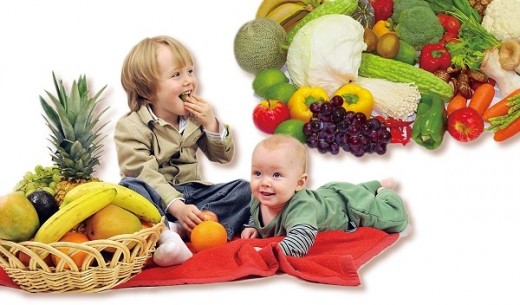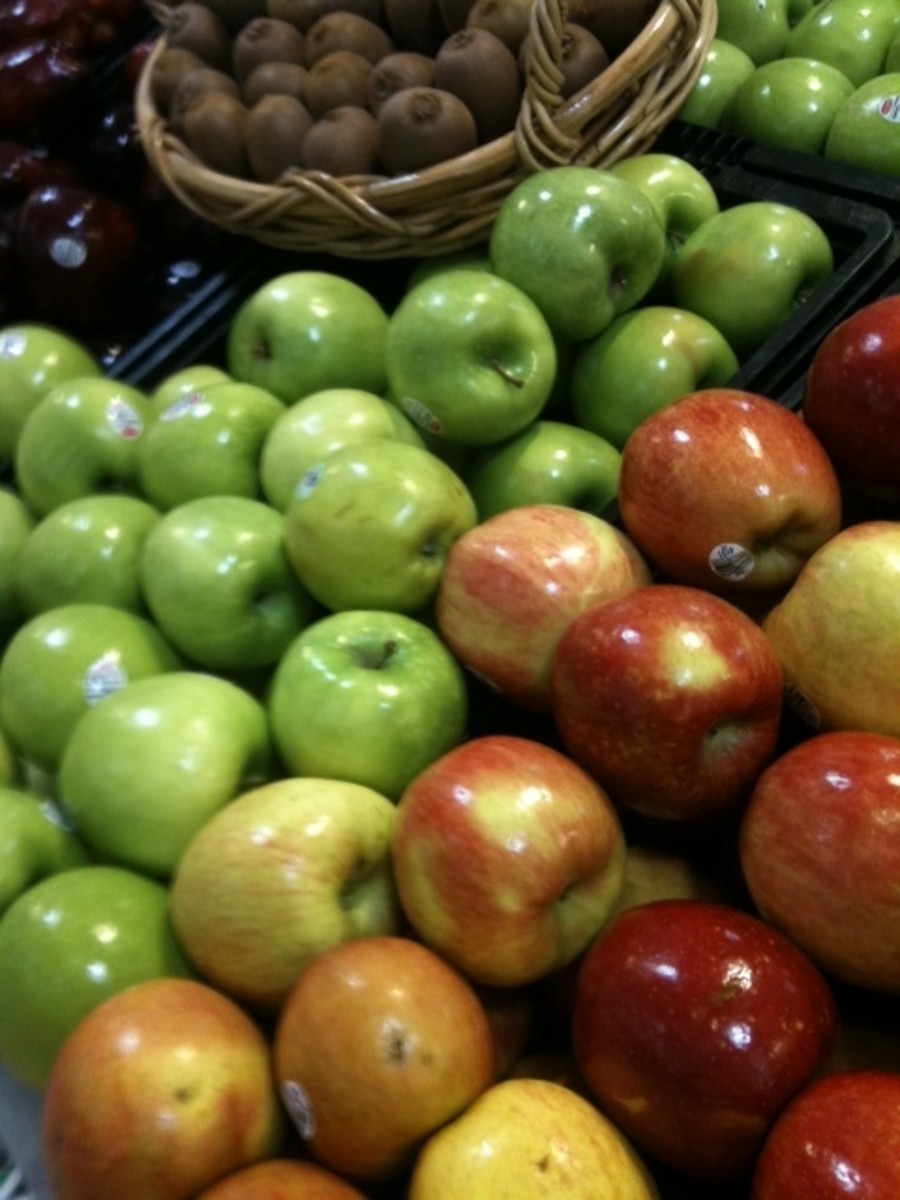Raise Healthy Children on a Vegetarian Diet
Healthy Vegetarian Children
Children are constantly growing, and while growing they need plenty of vitamins and minerals; they need plenty of proteins, as well. The problem with vegetarian diets is that they limit meat consumption, but this shouldn't cause you to shy away from a diet that you believe in, as vegetarian diets can be healthy for everyone of all ages.
There are essentially 6 extremes of vegetarianism:
- Semi/Vegetarian: eats poultry and fish but no other meat
- Ovo-Vegetarian: eats eggs but no other meat
- Lacto-Ovo Vegetarian: eats dairy and eggs but no other meat
- Lacto-Vegetarian: eats dairy, but no other meat or egg
- Vegan: eats only food from plant sources, to include fruits, vegetables, and grains
- Macrobiotic Vegetarian: does not eat meat, poultry, dairy, or eggs; slowly eliminates, fish, fruits, and vegetables, until the diet consists of just brown rice and grains (not a healthy form of vegetarianism)
No matter what vegetarian diet you and your family are on, it is very important that everyone, especially children have added vitamins and minerals included in their diet.

Supplements
Because children are growing and they do need extra supplementation than adults to ensure that they have strong bones and muscles, it is very important that vegetarian children have regular vitamins and supplements, as well as enriched foods.
As a parent, you will find that the easiest way to ensure that your child is getting all the proper vitamins and minerals that he needs, is to make sure that you are offering a varied diet packed with essential vitamins.
No matter what diet form of vegetarianism you and your family practice, you will want to make sure that you do whatever you can to ensure your child gets all the proper nutrients, as some forms of vegetarianism do not supply enough nutrients, and in these cases, it's important to know which foods contain a good supply of different vitamins.
It is easy for a vegetarian child to suffer a vitamin deficiency because of dietary concerns, which is why it is very important to watch what your child eats and to provide a varied diet.
Vitamin Enriched Foods
- Vitamin B12: dairy, eggs, nutritional yeast, and
vitamin-fortified cereals, breads, and soy and rice
drinks
- Vitamin D: milk, vitamin D-fortified orange juice,
and other vitamin fortified products
- Calcium: dairy products, dark green leafy
vegetables, broccoli, dried beans, sweet potatoes, and calcium-fortified products
- Protein: dairy products, eggs, tofu, soy
products, peas, beans, lentils, dried beans, nuts, legumes, wheat
- Iron: eggs, peas, beans, lentils, dried beans, chickpeas, seeds, dried fruits, whole
grains, leafy green vegetables, and iron-fortified cereals and bread
- Zinc: wheat germ, nuts, fortified cereal, dried beans, pumpkin seeds, brown rice, whole grains, legumes, spinach.
If your child will be on a diet that eliminates milk and dairy products, you will want to make sure that you offer daily calcium supplements.
Also, keep in mind that iron that is supplied by non-meat sources is best absorbed by the body when combined with Vitamin C, so it's a good idea to mix fruits and vegetables with each meal.
Nuts are great to have a snacks, as they provide vitamins A and E, as well phosphorous and potassium. Peanut butter is a great way to provide this value to children, and most typically enjoy PB&J sandwiches. Just be leery of children who come from a family with cases of nut allergies; for these children, do not offer nuts until at least two years old.
Healthy Vegetarian Kids
At different stages, children need different ratios of vitamins and minerals, which is why it is very important to keep an eye on fatigue, lethargy, anemia, and vitamin deficiencies.
Infants and Babies- Breastfed infants should receive a source of vitamin B12; if the mother isn't supplemented, you will also want to add a Vitamin D supplement. When the infant is introduced to solids, make sure to offer plenty of protein enriched foods like pureed tofu, cottage cheese, yogurt, soy yogurt, and pureed or strained legume.
Toddlers: important to ensure that vitamin D, vitamin B12, iron, calcium, protein, and zinc are properly supplemented in the diet. Typically, toddlers will take to fortified cereals to help supplement their diet.
Kids and Teens: important to ensure that iron, zinc, calcium, vitamin D, and vitamin B12 are supplemented in the diet. Add plenty of whole grain foods, fruits, vegetables, and nuts. Teenage girls need to get plenty of iron- eggs, lentils, nuts, seeds and chickpeas are great sources.
It is very important that you keep an eye on your vegetarian children, so that you can ensure that they are getting proper calories to help support their growing and changing bodies. Never been scared to add supplements to your child's diet, especially if
you feel that he is not consuming enough vitamins and minerals. You want to make sure that your child is getting enough vitamins so that his body is growing properly and he is developing at an average pace.
The two main concerns for maintaining a healthy vegetarian child will be:
- Providing protein and amino acids. Many believe that if you combine wheat and legumes you can provide optimum amino acid for the body than when consumed alone.
- Providing calcium and Vitamin D. Purchase plenty of enriched foods and juices.
No matter what age the child is, it is very important that if you have him on a vegetarian diet, you carefully watch for signs of deficiency, so that you can make any alterations in the diet or supplements before it's too late. Children can grow up successfully on vegetarian diets, but it is the adults responsibility to talk closely with the pediatrician to ensure the child is healthy.
Vegetarian Books for Kids and Parents
Healthy Diets for Children
- Diet for Children with a Peanut Allergy
- Soy Allergy Diet for Babies
- Healthy Vegetarian Children
- Gluten Free Diet for Kids with Autism
- Ketogenic Diet for Kids with Seizures
- What is the Anti-Asthma Diet - How Does it Affect Kids
- Special Diet to Relieve Asthma in Kids
- Healthy Weight Loss for Overweight Children
Vegetarian Diet
- Humans Were Not Created To Eat Meat - Vegetarian Diet Is Healthier
- What's the Difference Between a Vegan and a Vegetarian Diet?
- How to Be Healthy on a Vegetarian Diet
- How to Avoid an Unhealthy Vegetarian Diet
- The Best Healthy Vegetarian Diet Cookbooks
- Manage Diabetes with a Vegetarian Diet
- Relieve Arthritis Symptoms with a Vegetarian Diet
- Prevent Cancer with a Vegetarian Diet
- Can a Vegetarian Diet Reduce High Blood Pressure
- Continue a Vegetarian Diet While Pregnant
- Maintain a Vegetarian Diet While Nursing an Infant
Disclaimer:
Please be aware that the advice in
this article should in no way replace that of a licensed physician. If
you have any questions, please consult your child's pediatrician or a nutritionist for
any specific questions or concerns relating to your child's health and vegetarian diet.










